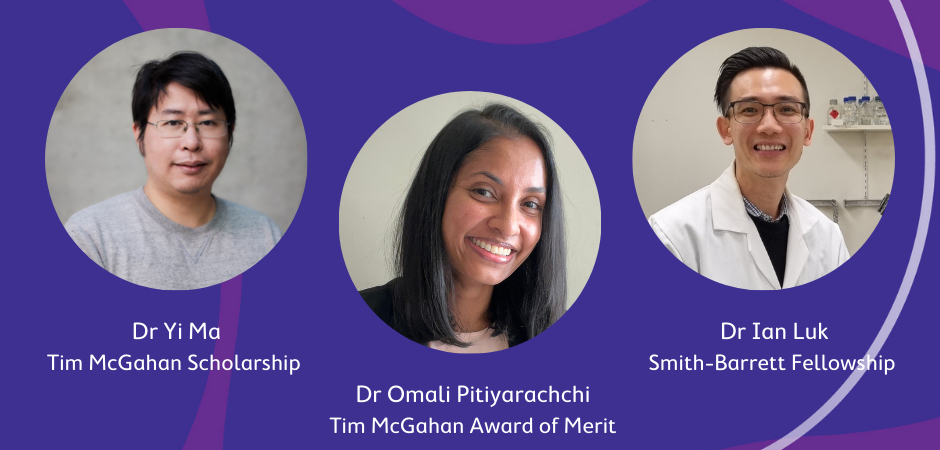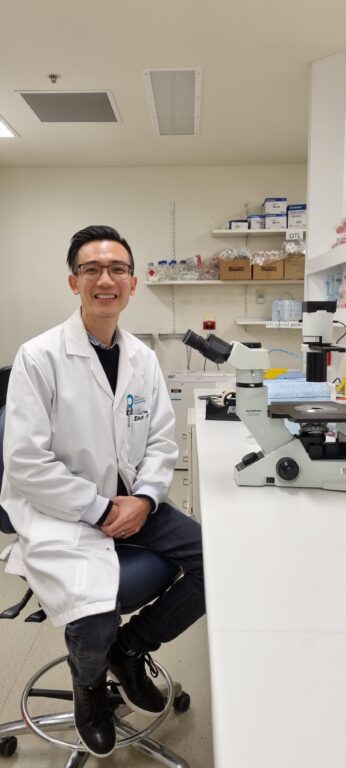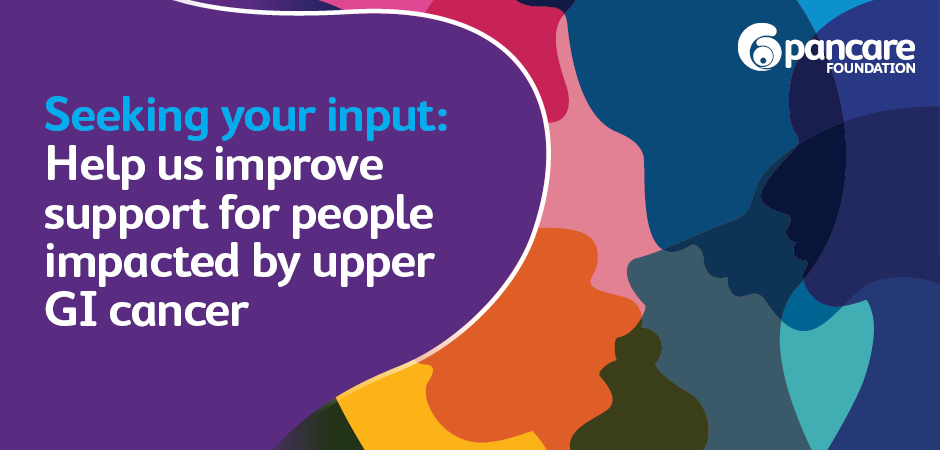
The Pancare Foundation proudly welcomes a new cohort of scholarship and award winners for 2022
In brief:
- Pancare Foundation continues to deliver significant investment in research for better treatments and better lives for Australians impacted by pancreatic and upper gastrointestinal cancers.
- This year Pancare Foundation will deliver $170,000 of much needed support for early-career researchers through our scholarship and award program:
- Dr Yi Ma has been awarded the Tim McGahan Scholarship.
- Dr Omali Pitiyarachchi has been awarded the Tim McGahan Award of Merit.
- Dr Ian Luk has been awarded the Smith-Barrett Fellowship.
Pancare Foundation awards and scholarships
We believe that fostering an engaged clinical research community is a key driver in the development of research programs and clinical trials that will progress the therapies and best-practice care for those impacted by upper gastrointestinal (GI) cancers into the future.
Our support of early-career clinicians and scientists is cultivating world-leading research and accelerating delivery of results that improve outcomes and quality of life for those living with upper GI cancer, their carers and families.
Pancare scholarships and awards are a key deliverable for Supporting Future Leaders, a strategic pillar of our Research Strategy and a driver for our pillars of delivering new treatments, early detection, personalised medicine strategies, optimal patient care and clinical trials.
This year we offered the Tim McGahan PhD Scholarship and an additional award to support a PhD project of merit. Importantly, Pancare has also introduced the new Smith-Barrett Fellowship to support an early-career researcher to undertake a major project in biliary cancer research.
Since establishing Pancare Foundation in 2011, we have delivered more than $15.7 million for Australian research programs and patient and carer support services. We have played a significant role in maintaining national focus on these devastating cancers.
Please join us in congratulating the 2022 scholarship and awards recipients:

Dr Yi Ma, a general surgery registrar from the Department of Surgery, University of Melbourne at the Austin Hospital has been awarded the 2022 Tim McGahan Scholarship, to continue his PhD studies on PAK in pancreatic cancer progression and its therapeutic potential.

Dr Omali Pitiyarachchi, a medical oncologist and PhD candidate from the Lowy Institute of Medical Research, University of NSW, has been awarded the 2022 Tim McGahan Award of Merit. Through her PhD research, Dr Pitiyarachchi aims to establish a live-tracking approach to measure therapeutic responses in a patient derived explant model of pancreatic cancer.

Dr Ian Luk, a post-doctoral research fellow from the Olivia Newton John Cancer Research Institute has been awarded the Smith-Barrett research fellowship. His research will develop an essential new model for studying biliary cancer and assessing effectiveness of new treatments.
In 2022, Pancare Foundation will deliver $170,000 of much needed support for early-career researchers through our scholarship and award program. Since establishing Pancare Foundation in 2011, we have delivered more than $15.7 million for Australian research programs and patient and carer support services. We have played a significant role in maintaining national focus on these devastating cancers.
Pancare Foundation’s Head of Research, Dr Toni Ryan, said of this year’s winners, “Pancare’s ultimate goal is to improve the outcomes for those suffering upper GI cancers, including improvement in the understanding and awareness of risk factors, early detection, new personalised therapies, better supportive care and increasing access to clinical trials. Achieving these hinges on the drive and passion of researchers that devote their career to examining the difficult questions that arise from cancers with very poor outcomes. We love supporting early-career researchers such as Dr Ma, Dr Pitiyarachchi and Dr Luk in their research in upper GI cancers, knowing that this will play a crucial role in shaping their research focus.”
Tim McGahan PhD Scholarship – 2022 recipient Dr Yi Ma
The newest Pancare Foundation scholarship has been named in honour of Timothy McGahan. Tim McGahan was a respected vascular surgeon from Brisbane, well known for his friendly demeanour and ability to calmly navigate high stress situations. He was a caring brother to nine, enthusiastic father to three, doting grandfather to two, adoring husband to one and unconditional friend to countless others.
Tim was diagnosed with metastatic pancreatic cancer in May 2020 and despite a legendary battle, passed away just shy of 12 months from his diagnosis. Tragically, his younger brother Andrew, a celebrated author, died from the same disease two years earlier.

Although devastated by his loss, the social and professional community Tim left behind were invigorated by his legacy to ‘fulfil your potential’ every single day. As a result, just over $70,000 was raised for Pancare in his honour. The McGahan family now hope this award will help a dedicated PhD candidate fulfil their own potential in finding new ways to diagnose this terrible disease earlier.
On behalf of the McGahan family and their generous supporters who made this award possible, Pancare is thrilled to announce the recipient as Dr Yi Ma.
Dr Yi Ma is a general surgery registrar who is currently undertaking a PhD project examining the role of P21 activated kinase (PAK) in pancreatic cancer progression, with a special interest in how this knowledge can be used to create an anti-cancer immune response and modify a cancer survival strategy called autophagy.
Having an interest in a career in medicine, early research subjects within his medicine degree sparked an interest in research, initially in motor neuron disease. During his studies he developed an interest in hepato-biliary surgery and research, particularly following his experiences treating a young man who was diagnosed with end stage cancer. What struck him was the lack of novel treatments or clinical trials that may have provided options or hope for this young patient and his family. The impact of being responsible for delivering this news has made a profound impact on Dr Ma’s decisions to pursue a PhD into pancreatic cancer research.
Dr Ma describes the need to overcome two issues that contribute to poor prognosis of pancreatic cancer, one is poor early detection and the other is lack of effective systemic treatment.
Dr Ma‘s project tackles one of the most prevalent mutations identified in pancreatic cancer, which has been deemed undruggable so far. Over 90% of pancreatic cancer is driven by a mutation in the KRAS gene. KRAS is part of a cellular signalling cascade that drives the cancer and Yi has focused on a downstream member of this cascade, PAK. He is interested in the therapeutic potential to block KRAS signalling by hindering the activity of PAK.
Dr Ma has set out to determine the role PAK4 (a specific type of PAK) plays in reducing the body’s immune response to pancreatic cancer, particularly by examining the effect PAK4 has on a cancer survival mechanism called autophagy. Autophagy is a way that cancer cells recycle parts of itself to create energy and in the process also make it invisible to the body’s immune system by removing recognisable elements of its external surface. The result of this project will hopefully not only enhance our understanding of the molecular mechanisms behind pancreatic cancer immune evasion and autophagy, but also guide future development of treatment for this deadly disease.
Dr Ma’s PhD is supervised by Associate Professor Mehrdad Nikfarjam OAM at the Austin Hospital.
Dr Ma said: “It is my great honour to have received the Tim McGahan PhD Scholarship and I am grateful for the support of Pancare Foundation on my research project. As a clinician, I have seen many patients pass away from pancreatic cancer, and the sad truth about this deadly disease is that there is so far no effective treatment for it once it gets beyond the early stage.
One important phenomenon that pancreatic cancer cells adopt is to hide from the bodies’ immune system. My project will examine if we can change the pancreatic cancer cells to make them more prone to killing by immune cells. With the support from Pancare, we will be able to access more advanced experimental techniques to address this important question and hopefully guide us in therapy development for this disease.
While it is still a long way before we can conquer this deadly disease, every small step will count. As a clinician, I hope that one day when I disclose to my patients about their diagnosis of pancreatic cancer, I can stop telling them that there is no cure once it has spread. ”
Tim McGahan Award of Merit – 2022 recipient Dr Omali Pitiyarachchi
Pancare has awarded the Tim McGahan Award of Merit to PhD student Dr Omali Pitiyarachchi.
Dr Pitiyarachchi is a medical oncologist and PhD candidate (UNSW) from Sydney, Australia with a Bachelor of Science (Advanced) and a MBBS from the University of Sydney. After graduation, she completed basic physician training at St Vincent’s Hospital, Sydney. She then undertook advanced training in Clinical Haematology at Liverpool Hospital and advanced training in Medical Oncology at the Chris O’Brien Lifehouse/Royal Prince Alfred Hospital and Concord Repatriation General Hospital.

During her Clinical/Research Fellowship at the Prince of Wales Hospital last year she developed a special interest in research and clinical work in gastrointestinal cancers. Under the guidance of her clinical supervisor, Prof David Goldstein, a senior medical oncologist and established researcher in gastrointestinal cancers, she was introduced to her principal supervisor Prof Phoebe Phillips who leads the Pancreatic Cancer Translational Research Group (PCTRG) at the Lowy Cancer Research Centre, UNSW Sydney. The engagement with the PCTRG gave her an ideal insight into their invaluable work in pancreatic cancer research and inspired her to undertake her PhD within their research group.
Dr Pitiyarachchi has identified that one of the reasons behind the poor prognosis for pancreatic cancer is due to difficulties in personalising therapy for individual patients, which is required due to the variation of tumour characteristics between patients. To overcome this, the overall aim of her PhD project is to clinically validate the research group’s patient-derived explant model of pancreatic cancer, as well as the development of a live-tracking approach to measure therapeutic responses in the model. Translation of the findings of this project into clinical practice will lead to a more personalised approach to treatment and hopefully improve the survival of patients with PDAC globally.
The project is an ideal situation to forge collaboration with clinicians, industry and academia with expertise in pancreatic cancer research. In fact, she is already involved in a Phase-2 clinical trial in patients with pancreatic cancer led by her two primary supervisors Prof Phoebe Phillips and Prof David Goldstein.
Dr Pitiyarachchi says “With the assistance of Pancare’s Tim McGahan Award of Merit and the mentorship of my supervisorial team, my goal is to be a competitive future clinician-researcher building on basic research proficiency and integrating research into clinical trials, in order to improve outcomes for patients with pancreatic cancer.”
Smith-Barrett Fellowship – 2022 recipient Dr Ian Luk
Pancare Foundation is proud to host the Smith-Barrett Fellowship – ‘supercharging biliary cancer research’. This award is supported by funding from Rod’s Accelerator for Biliary Cancer – a Highland Foundation Initiative fund, founded by the Smith family of PFD Food Services. It has been created in memory of long-standing close friend of the Smith family, Rod Barrett, who bravely battled biliary cancer and passed away in January 2020.
Rod, Head of Ford Performance Vehicles for a time in the mid 2000s, had a long-time involvement in the V8 motor industry. He was known for his genuine passion, drive and enthusiasm for the industry, ignited the first time he drove a supercharged Falcon GT.
This fellowship is created in the spirit of Rod’s drive for supercars, to accelerate biliary cancer research by encouraging and supporting early-career researchers to achieve success in high-quality research related to identification of new therapeutic targets, risk factors, early detection, clinical care and clinical trials in biliary cancer.

On behalf of the Highland Foundation, Pancare is proud to award the Smith-Barrett Fellowship for biliary cancer research to Dr Ian Luk.
Dr Luk is an early-career researcher in the Gastrointestinal Cancers Program at the Olivia Newton John Cancer Research Institute. His research focuses on the discovery of transcriptional regulators involved in the progression of gastrointestinal cancers, which impacts the ability of these tumours to grow, metastasize and respond to therapy.
Before starting his university degree, Dr Luk knew that he wanted to have a career in medical research. He completed his Bachelor of Applied Sciences (Biomedical Sciences) at RMIT university in 2009 and subsequently moved to the University of Melbourne to complete his Honour’s year in 2010, where he was awarded the Dean’s Honour list.
Starting off as a researcher in epilepsy, Dr Luk became inspired to make the change over to cancer research when he attended a presentation by his future supervisor Professor John Mariadason. Coupled with the loss of a childhood friend who had passed away from cancer, Dr Luk knew that this was the field that he wanted to pursue his career in.
In 2011, Dr Luk initially started as a research assistant in Professor Mariadason’s laboratory before starting his PhD candidature in late 2012, where his research project focused on the role of the EHF and CDX1 transcription factors in regulating the differentiation and progression of colorectal tumours. He was awarded his PhD in 2018, where he continued his research as a post-doctoral fellow in Professor Mariadason’s laboratory expanding his research and expertise into other gastrointestinal cancers including gastric cancers and biliary tract cancers.
Dr Luk has identified that a major barrier for the study of biliary cancer is that it is a relatively rare cancer in which there is a lack of robust models that scientists can study both the biology of the cancer and potential treatments. His project seeks to develop and validate models of biliary cancer that mimic the human disease. He hopes that these models will lead to a wide range of collaborative studies that will expediate data that will lead to clinical trials of new therapies for biliary cancer.
Dr Luk says “The difficulty in advancing treatments for rare cancers is compounded by the poor survival and relative infrequency of patients to study. The Smith-Barrett Fellowship will provide funding to establish a much-needed model to study biliary cancer, which we can use to test and enhance existing therapies and study this cancer carefully to design new therapeutic targets.”
Help fund research that seeks to discover new and specialised treatments for upper gastrointestinal cancers.
Read more . . .
Read more . . .






